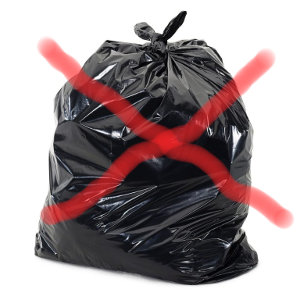How can we dispose of our rubbish, i.e. what cannot be composted, repurposed/upcycled or recycled without using a plastic bag, this modern menace?
In Greece, as in many other parts of the world, people used to re-use plastic grocery bags handed-out free for throwing their garbage, but a new law has applied a tax on plastic shopping bags, so as they are charged people are avoiding them (about 80% reduction in 2 months!). But this also means that consumers now have to buy other plastic bags, from the same grocery store, for their rubbish. Its win-win for the grocery store but not for the environment or our pockets.
In non-vegan households that do not have dogs, these famous omnivores, there are food leftovers that cannot be composted. Perhaps your neighbours are complaining of real or fictitious foul smells or insects emanating from your compost bin. Perhaps your municipality does not have special bins for greasy, meat and dairy-based food leftovers. (Ours has fortunately installed three different points within walking distance, but very few people are using them - old habits die hard). In more environmentally-aware places with city-wide composting, like San Francisco, throwing your food waste in the designated compost bin is mandatory; hopefully this will become the norm globally in this century or the next(see, we are realists).
One solution that may come to mind is recycled plastic bin liners. These may contain anywhere from 10 to 80% recycled plastic, but they still contain plastic. But you soon realise this is a fake, and quite expensive, solution, as you are actually condemning recycled and new plastic to the landfill where it may be discovered in good shape by a future earthly or alien civilisation!
The next option is to use a biodegradable plastic litter bag. Unfortunately, it is not as simple either. Biodegradable bags using plastic made from corn appeared in the early 1990s thanks to an invention by an engineer at Cargill, the largest corn producer who made an earlier process economically viable. The raw material for these bags is called polylactic acid or PLA, and it is produced by fermentation. PLA, which is also made from wheat, beets and potatoes but less commonly, is still far more expensive than plastic made from oil and natural gas (PVC). PLA has lower environmental impacts although its production has about 60% lower greenhouse gas emissions than petroleum-based plastic. An unfortunate detail is that PLA is typically made from genetically modified Corn.
PLA bags need special conditions to fully biodegrade in large-scale industrial composting facilities, and will not biodegrade properly in your own composting bin or heap. They will not biodegrade at all if they end up in a landfill, as landfills are anaerobic (no oxygen) and oxygen is crucial for biodegradation. For example, if you look at these two random biodegradable bin liner products: their BPI (Biodegradable Products Institute) certification logo clearly notes: "Compostable in Industrial Facilities, Not suitable for backyard composting". See: https://www.ifyoucare.com/household/compostable-trash-bags/ and http://www.naturbag.com/compostable-bags-and-liners
Always read the small print, even on ecolabels!
PLA bags can also cause significant problems for plastic recyclers as PLA and PET do not mix. That said, you should avoid throwing plastic bags in recycling bins in any case, as they may damage the sorting mechanism in recycling plants.
A sign that a rubbish bag is 'plant-based' or from 'bioplastic' does not guarantee it will even biodegrade - it will usually end up as small pieces of polyethene. The most dubious sign arguably is 'degradable' which does not really signify anything apart from that it may be even more harmful to marine life than non-degradable when it breaks down and becomes microplastic.
The most ecological designation when it comes to PLA bags, and if given by a reputable standard authority, is 'Home Compostable'. Such a designation seems to be common in Australia. One of few options we could find online is the 'GMO-free, third grade (spoilt, unsuitable for human or animal consumption) corn-based' Compost-A-Pak: https://compostapak.com.au/ These are "certified compostable for both home and council organics programs" which means that it can be composted in your garden compost heap. It is unclear if it can be fully composted in a small compost bin on your balcony, though.
The non-tech, but equally problematic, alternatives are:
1. In theory, you could use no plastic bag at all, or reuse the same plastic bag and wash it, and just empty your rubbish directly in the council/municipal bin. But as you have guessed this is illegal in most places.
2. Before throwing your rubbish in the bin, wrap individual rubbish pieces in a newspaper - if you still buy printed newspapers - or with kitchen towel paper. But paper costs trees and energy to be produced, and it does not compost properly in landfills.
3. Use cartons, such as juice or milk cartons, which are mercilessly multi-layered paperboard, plastic and aluminium (75% paperboard, 20% polyethylene-plastic and 5% of aluminium and as such difficult - but not impossible - to recycle) so as to stuff your rubbish inside without using a bag, an idea included among others in this tongue-in-cheek video: https://youtu.be/oiThSyPHKAo
To recap, plastics account for up to 25% of volume in landfills and a lot is from plastic bags. These were some ideas for trying to escape the curse of the plastic bin liner. We certainly need more! Please comment below.

